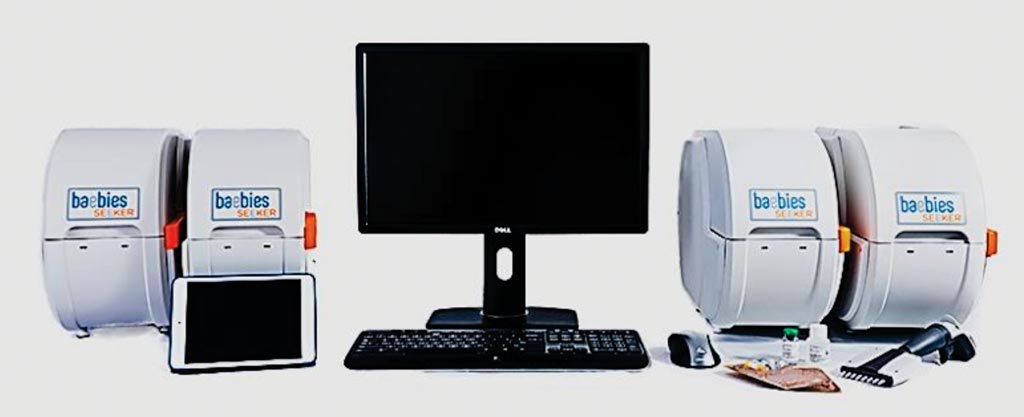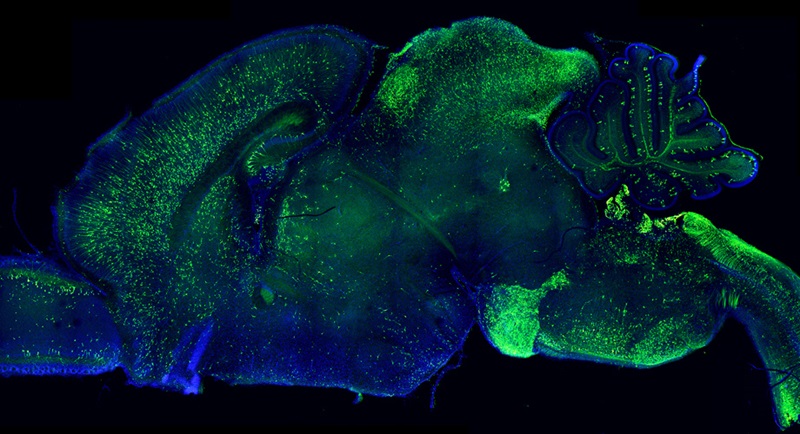Screening System Detects Four Metabolic Disorders
|
By LabMedica International staff writers Posted on 15 Feb 2017 |

Image: The SEEKER workstation, a high throughput laboratory solution that measures enzymatic activity from dried blood spot specimens (Photo courtesy of Baebies).
Lysosomal Storage Disorders (LSDs) are a group of rare, inherited metabolic disorders in which enzymes (proteins) that normally eliminate unwanted substances in the body’s cells are not at normal levels or functioning properly. If not detected and treated in a timely manner, these disorders may cause organ damage, neurological disability or death.
A screening test for newborns that is designed to detect Mucopolysaccharidosis Type I (MPS I), Pompe disease, Gaucher disease and Fabry disease has received permission for marketing for these four LSDs. These four LSDs occur in approximately 1 in 1,500 to no more than 1 in 185,000 newborns and children, depending on the disorder.
The US Food and Drug Administration evaluated data from a clinical study of 154,412 newborns in Missouri whose dried blood samples were tested for protein activity associated with MPS I, Pompe, Gaucher and Fabry. Efficacy was determined because the system was able to accurately identify at least one of each of these four LSDs in 73 of the screened newborns.
The FDA reviewed the data for the Seeker System through the de novo premarket review pathway, a regulatory pathway for devices of a new type with low-to-moderate-risk that are not substantially equivalent to an already legally marketed device and for which special controls can be developed, in addition to general controls, to provide a reasonable assurance of safety and effectiveness of the devices.
The Seeker System, consisting of the Seeker LSD Reagent Kit- IDUA|GAA|GBA|GLA and Seeker Instrument, works by measuring the activity level of proteins required for healthy lysosomal storage found in dried blood samples collected from the prick of a newborn’s heel 24 to 48 hours after birth. The Seeker Instrument is a device that automates the analysis of dried blood spots. Reduced enzyme activity of proteins associated with any of the four LSDs detected by the kit may indicate presence of a disorder. Results showing reduced enzyme activity must be confirmed using other testing methods, such as biopsies, genetic and other laboratory tests.
Alberto Gutierrez, Ph.D., director of the FDA Office of In Vitro Diagnostics and Radiological Health, said, “The Secretary of HHS recently added Pompe and MPS I to the list of routine recommended newborn screening programs and it is anticipated that additional states will begin requiring use of screening tests to detect these disorders. Accurate screening tests will help with early detection, treatment and control of these rare disorders in newborns, before permanent damage occurs. That’s why availability of LSD screening methods that have been assessed for accuracy and reliability by the FDA are so important.”
A screening test for newborns that is designed to detect Mucopolysaccharidosis Type I (MPS I), Pompe disease, Gaucher disease and Fabry disease has received permission for marketing for these four LSDs. These four LSDs occur in approximately 1 in 1,500 to no more than 1 in 185,000 newborns and children, depending on the disorder.
The US Food and Drug Administration evaluated data from a clinical study of 154,412 newborns in Missouri whose dried blood samples were tested for protein activity associated with MPS I, Pompe, Gaucher and Fabry. Efficacy was determined because the system was able to accurately identify at least one of each of these four LSDs in 73 of the screened newborns.
The FDA reviewed the data for the Seeker System through the de novo premarket review pathway, a regulatory pathway for devices of a new type with low-to-moderate-risk that are not substantially equivalent to an already legally marketed device and for which special controls can be developed, in addition to general controls, to provide a reasonable assurance of safety and effectiveness of the devices.
The Seeker System, consisting of the Seeker LSD Reagent Kit- IDUA|GAA|GBA|GLA and Seeker Instrument, works by measuring the activity level of proteins required for healthy lysosomal storage found in dried blood samples collected from the prick of a newborn’s heel 24 to 48 hours after birth. The Seeker Instrument is a device that automates the analysis of dried blood spots. Reduced enzyme activity of proteins associated with any of the four LSDs detected by the kit may indicate presence of a disorder. Results showing reduced enzyme activity must be confirmed using other testing methods, such as biopsies, genetic and other laboratory tests.
Alberto Gutierrez, Ph.D., director of the FDA Office of In Vitro Diagnostics and Radiological Health, said, “The Secretary of HHS recently added Pompe and MPS I to the list of routine recommended newborn screening programs and it is anticipated that additional states will begin requiring use of screening tests to detect these disorders. Accurate screening tests will help with early detection, treatment and control of these rare disorders in newborns, before permanent damage occurs. That’s why availability of LSD screening methods that have been assessed for accuracy and reliability by the FDA are so important.”
Latest Clinical Chem. News
- 3D Printed Point-Of-Care Mass Spectrometer Outperforms State-Of-The-Art Models
- POC Biomedical Test Spins Water Droplet Using Sound Waves for Cancer Detection
- Highly Reliable Cell-Based Assay Enables Accurate Diagnosis of Endocrine Diseases
- New Blood Testing Method Detects Potent Opioids in Under Three Minutes
- Wireless Hepatitis B Test Kit Completes Screening and Data Collection in One Step
- Pain-Free, Low-Cost, Sensitive, Radiation-Free Device Detects Breast Cancer in Urine
- Spit Test Detects Breast Cancer in Five Seconds
- Electrochemical Sensors with Next-Generation Coating Advances Precision Diagnostics at POC
- First-Of-Its-Kind Handheld Device Accurately Detects Fentanyl in Urine within Seconds
- New Fluorescent Sensor Array Lights up Alzheimer’s-Related Proteins for Earlier Detection
- Automated Mass Spectrometry-Based Clinical Analyzer Could Transform Lab Testing
- Highly Sensitive pH Sensor to Aid Detection of Cancers and Vector-Borne Viruses
- Non-Invasive Sensor Monitors Changes in Saliva Compositions to Rapidly Diagnose Diabetes
- Breakthrough Immunoassays to Aid in Risk Assessment of Preeclampsia
- Urine Test for Monitoring Changes in Kidney Health Markers Can Predict New-Onset Heart Failure
- AACC Releases Comprehensive Diabetes Testing Guidelines
Channels
Molecular Diagnostics
view channel
World’s First One-Minute Hepatitis C Antibody Test Facilitates Quick Triage
Rapid and accurate testing is crucial in the fight against Hepatitis C. Hepatitis C blood testing determines whether someone has been infected with the Hepatitis C virus. Having regular access to testing... Read more
Game-Changing Blood Test for Stroke Detection Could Bring Life-Saving Care to Patients
Stroke is the primary cause of disability globally and ranks as the second leading cause of death. However, timely early intervention can prevent severe outcomes. Most strokes are ischemic, resulting from... Read moreHematology
view channel
Next Generation Instrument Screens for Hemoglobin Disorders in Newborns
Hemoglobinopathies, the most widespread inherited conditions globally, affect about 7% of the population as carriers, with 2.7% of newborns being born with these conditions. The spectrum of clinical manifestations... Read more
First 4-in-1 Nucleic Acid Test for Arbovirus Screening to Reduce Risk of Transfusion-Transmitted Infections
Arboviruses represent an emerging global health threat, exacerbated by climate change and increased international travel that is facilitating their spread across new regions. Chikungunya, dengue, West... Read more
POC Finger-Prick Blood Test Determines Risk of Neutropenic Sepsis in Patients Undergoing Chemotherapy
Neutropenia, a decrease in neutrophils (a type of white blood cell crucial for fighting infections), is a frequent side effect of certain cancer treatments. This condition elevates the risk of infections,... Read more
First Affordable and Rapid Test for Beta Thalassemia Demonstrates 99% Diagnostic Accuracy
Hemoglobin disorders rank as some of the most prevalent monogenic diseases globally. Among various hemoglobin disorders, beta thalassemia, a hereditary blood disorder, affects about 1.5% of the world's... Read moreImmunology
view channel.jpg)
AI Predicts Tumor-Killing Cells with High Accuracy
Cellular immunotherapy involves extracting immune cells from a patient's tumor, potentially enhancing their cancer-fighting capabilities through engineering, and then expanding and reintroducing them into the body.... Read more
Diagnostic Blood Test for Cellular Rejection after Organ Transplant Could Replace Surgical Biopsies
Transplanted organs constantly face the risk of being rejected by the recipient's immune system which differentiates self from non-self using T cells and B cells. T cells are commonly associated with acute... Read more
AI Tool Precisely Matches Cancer Drugs to Patients Using Information from Each Tumor Cell
Current strategies for matching cancer patients with specific treatments often depend on bulk sequencing of tumor DNA and RNA, which provides an average profile from all cells within a tumor sample.... Read more
Genetic Testing Combined With Personalized Drug Screening On Tumor Samples to Revolutionize Cancer Treatment
Cancer treatment typically adheres to a standard of care—established, statistically validated regimens that are effective for the majority of patients. However, the disease’s inherent variability means... Read moreMicrobiology
view channel
Integrated Solution Ushers New Era of Automated Tuberculosis Testing
Tuberculosis (TB) is responsible for 1.3 million deaths every year, positioning it as one of the top killers globally due to a single infectious agent. In 2022, around 10.6 million people were diagnosed... Read more
Automated Sepsis Test System Enables Rapid Diagnosis for Patients with Severe Bloodstream Infections
Sepsis affects up to 50 million people globally each year, with bacteraemia, formerly known as blood poisoning, being a major cause. In the United States alone, approximately two million individuals are... Read moreEnhanced Rapid Syndromic Molecular Diagnostic Solution Detects Broad Range of Infectious Diseases
GenMark Diagnostics (Carlsbad, CA, USA), a member of the Roche Group (Basel, Switzerland), has rebranded its ePlex® system as the cobas eplex system. This rebranding under the globally renowned cobas name... Read more
Clinical Decision Support Software a Game-Changer in Antimicrobial Resistance Battle
Antimicrobial resistance (AMR) is a serious global public health concern that claims millions of lives every year. It primarily results from the inappropriate and excessive use of antibiotics, which reduces... Read morePathology
view channel
Groundbreaking CRISPR Screen Technology Rapidly Determines Disease Mechanism from Tissues
Thanks to over a decade of advancements in human genetics, scientists have compiled extensive lists of genetic variations linked to a wide array of human diseases. However, understanding how a gene contributes... Read more
New AI Tool Classifies Brain Tumors More Quickly and Accurately
Precision in diagnosing and categorizing tumors is essential for delivering effective treatment to patients. Currently, the gold standard for identifying various types of brain tumors involves DNA methylation-based... Read moreTechnology
view channel
New Diagnostic System Achieves PCR Testing Accuracy
While PCR tests are the gold standard of accuracy for virology testing, they come with limitations such as complexity, the need for skilled lab operators, and longer result times. They also require complex... Read more
DNA Biosensor Enables Early Diagnosis of Cervical Cancer
Molybdenum disulfide (MoS2), recognized for its potential to form two-dimensional nanosheets like graphene, is a material that's increasingly catching the eye of the scientific community.... Read more
Self-Heating Microfluidic Devices Can Detect Diseases in Tiny Blood or Fluid Samples
Microfluidics, which are miniature devices that control the flow of liquids and facilitate chemical reactions, play a key role in disease detection from small samples of blood or other fluids.... Read more
Breakthrough in Diagnostic Technology Could Make On-The-Spot Testing Widely Accessible
Home testing gained significant importance during the COVID-19 pandemic, yet the availability of rapid tests is limited, and most of them can only drive one liquid across the strip, leading to continued... Read moreIndustry
view channel
Danaher and Johns Hopkins University Collaborate to Improve Neurological Diagnosis
Unlike severe traumatic brain injury (TBI), mild TBI often does not show clear correlations with abnormalities detected through head computed tomography (CT) scans. Consequently, there is a pressing need... Read more
Beckman Coulter and MeMed Expand Host Immune Response Diagnostics Partnership
Beckman Coulter Diagnostics (Brea, CA, USA) and MeMed BV (Haifa, Israel) have expanded their host immune response diagnostics partnership. Beckman Coulter is now an authorized distributor of the MeMed... Read more_1.jpg)









 Reagent.jpg)



